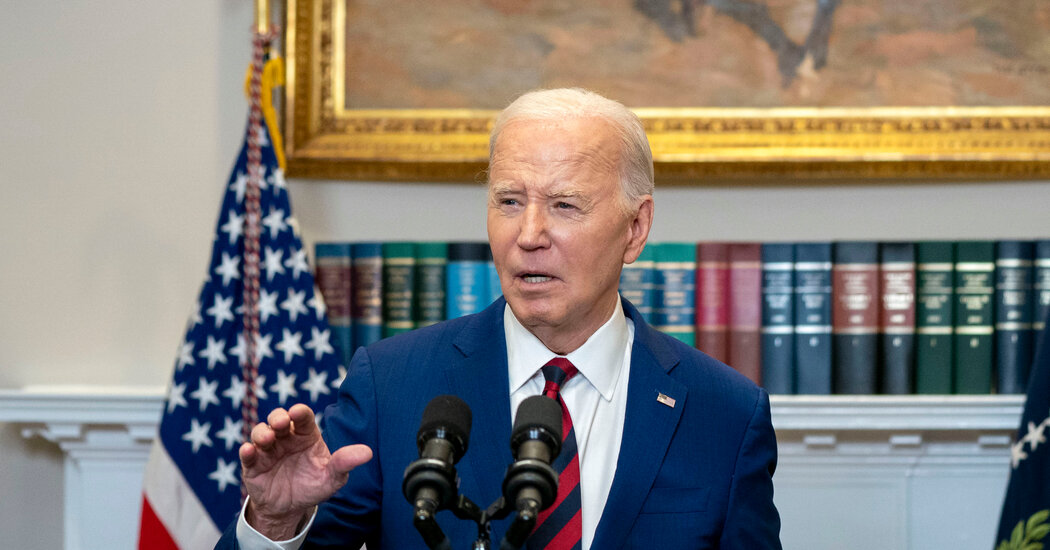President Biden spoke with Xi Jinping, China’s leader, in a call on Tuesday morning that was aimed at addressing a variety of combative and cooperative issues, as the United States grapples with wars and other global crises, U.S. and Chinese officials said.
The topics raised by Mr. Biden included fighting narcotics production, the Middle East conflict, North Korea’s nuclear program and China’s support of Russia during the Ukraine war, according to a White House summary of the call.
Mr. Biden intended the talk to be a “check-in” rather than a discussion with concrete outcomes, said a senior administration official, who spoke to a small group of reporters on Monday night on the condition of anonymity, as is customary for such Washington briefings. But it was a crucial marker during a pivotal political year and as the countries try to steady a relationship that hit a multidecade low last year.
The call took place days ahead of a trip to China by Treasury Secretary Janet L. Yellen, who will be followed soon afterward by Secretary of State Antony J. Blinken, the official said. Those would be the first visits to China by cabinet members this year; both officials traveled to Beijing last year to stabilize relations after tempers flared during the Chinese spy balloon episode.
Since last summer, Mr. Biden and Mr. Xi have sought to prevent any eruptions between their nations. Mr. Biden is seeking to focus on his tight race for re-election this year. Mr. Xi is grappling with a range of domestic issues, including a troubled economy and corruption in the top ranks of his military.
Mr. Biden and Mr. Xi held a face-to-face summit in November at a lush estate in Woodside, outside San Francisco. The two also met in November 2022 in Bali, Indonesia — their first in-person summit as national leaders — and had their last call in July 2022.
The senior U.S. official told reporters that the call on Tuesday was part of U.S. efforts toward the modest goals of maintaining contact and managing competition “responsibly.”
Mr. Biden raised two issues over China’s aggression in the Pacific: Taiwan and the South China Sea, according to the White House summary.
The Biden administration has warned China to rein in its coast guard ships, which have been firing water cannons at Philippine resupply ships in a contested area of the South China Sea. And the United States has said the Chinese military is using jets and ships in a provocative manner near Taiwan, the de facto independent island whose status is the biggest flashpoint between Washington and Beijing.
However, Mr. Biden reiterated to Mr. Xi that the United States abides by its “one China policy,” which recognizes the mainland People’s Republic of China as the sole legitimate government of China — while saying nothing about Taiwan’s status.
During the call, Mr. Xi “stressed that the Taiwan question is the first red line that must not be crossed in China-U.S. relations,” according to a description of the call released by the Chinese government. Mr. Xi called for “concrete actions” from the United States to demonstrate a commitment not to support Taiwan’s independence, the description said.
Like previous Chinese leaders, Mr. Xi has said Taiwan must be brought under Communist Party rule, by force if necessary. Mr. Biden has said four times that U.S. troops will defend Taiwan if China tries to invade. Those remarks were a deviation from the decades-long efforts by the U.S. government to leave ambiguous whether the American military would defend Taiwan from a Chinese assault.
Joseph Wu, the foreign minister of Taiwan, said in an interview with The New York Times in Taipei on Thursday that China had steadily increased its military activity around Taiwan, as well as its cyberespionage efforts and promotion of online disinformation, all amounting to “gray zone” aggressions short of a full war. “We need the U.S. to work closer with Taiwan,” he said.
In the call, Mr. Xi also criticized the “endless stream of measures” taken by the United States to try to suppress China’s economy, science and technology, the Chinese government’s summary said. Mr. Biden has imposed limits on the export of advanced semiconductors to China.
Mr. Biden told Mr. Xi that his government “will continue to take necessary actions to prevent advanced U.S. technologies from being used to undermine our national security, without unduly limiting trade and investment” and criticized China’s “unfair trade policies,” according to the White House summary of the call.
The senior U.S. official said Mr. Biden wanted to stress to Mr. Xi that China must not continue helping Russia rebuild its military-industrial base. Russian arms production has been robust despite economic sanctions imposed by the United States and other countries after President Vladimir V. Putin ordered the full-scale invasion of Ukraine in February 2022. The steady production of ammunition and missiles — as well as weapons aid from North Korea and Iran — is helping Russia in Ukraine.
China has picked up some areas of trade European nations have stopped, and that has allowed Russia to rebuild its weapons production capabilities, the official said.
Mr. Biden also wanted to get Mr. Xi to help curb the attacks on commercial ships in the Red Sea by the Houthi forces of Yemen, an Iran-backed military group that says it will continue strikes as long as Israel carries out its war with Hamas in Gaza, the U.S. official said. The Biden administration has pressed China to ask Iran to rein in the Houthis, especially since Chinese ships also pass through the Red Sea.
The official said Mr. Biden would like to cooperate further with China on several issues: limiting the export of chemicals used to make fentanyl, senior-level military talks, discussions over artificial intelligence and climate change policy.
Meaghan Tobin contributed reporting from Taipei, Taiwan.


